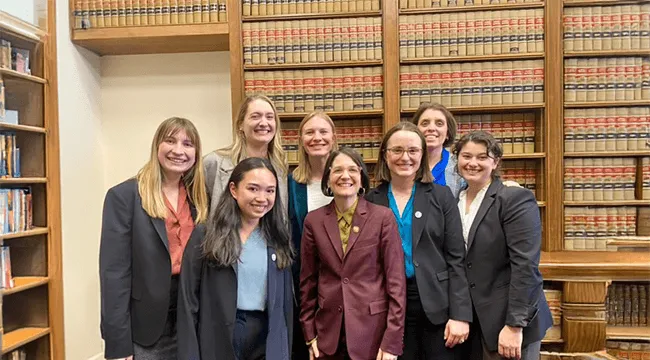Larner Group Represents at AAP Advocacy Conference Opposing Medicaid Budget Cuts
Larner medical students Olivia Domingue ’25, Stefanie Kelsey ’25, Kassondra Little ’25, Mikaela Mari ’26, and McLaine Rich ’25 and pediatrics resident Julie Ehrlich, M.D., joined Associate Professor of Pediatrics Rebecca Bell, M.D., at the national American Academy of Pediatrics (AAP) Advocacy Conference March 2–4 in Washington, D.C.
Nearly 400 pediatricians representing 44 states, Washington, D.C., and Puerto Rico gathered at the Capitol, where they urged lawmakers to reject any funding cuts to Medicaid and the Children’s Health Insurance Program (CHIP). The Larner group met with offices of the Vermont congressional delegation, including Rep. Becca Balint (D), Sen. Bernie Sanders (I), and Sen. Peter Welch (D).
This year’s conference and visits to Capitol Hill to advocate for Medicaid funding came at a pivotal moment: Nearly $900 billion worth of federal budget cuts are being considered, including to Medicaid. The week before the conference, the U.S. House of Representatives took the first step in the budget reconciliation process by narrowly adopting a budget resolution that would effectively require sweeping funding cuts to Medicaid and CHIP. Prior to the vote, the AAP issued a press statement opposing any cuts to these vital programs.
Over the first two days of the conference, attendees honed their advocacy skills, learned about key issues impacting child health, and heard from several inspiring plenary speakers. The conference culminated in meetings on Capitol Hill, where attendees urged legislators to keep Medicaid and CHIP strong. Conference participants spoke up about how vital Medicaid is for children—Medicaid covers almost half of all children in the United States and 38 percent of all Washington children—and the importance of preserving Medicaid access to care.
Because the House and Senate passed different budget resolutions, they will need to agree on and pass identical budgets before the relevant congressional committees begin working to determine how to meet the proposed funding levels. Given the state of play in Congress, it was a critical time for lawmakers to hear from pediatricians about why funding cuts to Medicaid and CHIP would harm child health.
“As a medical student interested in going into pediatrics, the conference opened my eyes to the many roles a pediatrician has in the community—advocacy being one of the most important … This experience further solidified my desire to pursue pediatrics and advocacy work.” — Mikaela Mari, Larner Medical Class of 2026
